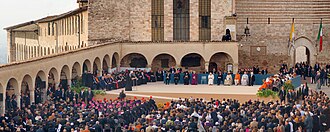
Back Pazifismus ALS سلامية Arabic Pacifismu AST Pasifizm Azerbaijani Пацыфізм Byelorussian Cinta damé BEW Пацифизъм Bulgarian শান্তিবাদ Bengali/Bangla ཞི་བདེ་རིང་ལུགས། Tibetan Pacifisme Catalan


Pacifism is the opposition or resistance to war, militarism (including conscription and mandatory military service) or violence. The word pacifism was coined by the French peace campaigner Émile Arnaud and adopted by other peace activists at the tenth Universal Peace Congress in Glasgow in 1901.[1] A related term is ahimsa (to do no harm), which is a core philosophy in Indian religions such as Hinduism, Buddhism, and Jainism. While modern connotations are recent, having been explicated since the 19th century, ancient references abound.
In modern times, interest was revived by Leo Tolstoy in his late works, particularly in The Kingdom of God Is Within You. Mahatma Gandhi propounded the practice of steadfast nonviolent opposition which he called "satyagraha", instrumental in its role in the Indian Independence Movement. Its effectiveness served as inspiration to Martin Luther King Jr., James Lawson, Mary and Charles Beard, James Bevel,[2] Thich Nhat Hanh,[3] and many others in the civil rights movement.
- ^ The Abolition of War: the Peace Movement in Britain, 1914–1919 by Keith Robbins. University of Wales Press, 1976. ISBN 978-0708306222 (p. 10).
- ^ James L. Bevel, The Strategist of the 1960s Civil Rights Movement" by Randy Kryn, a paper in David Garrow's 1989 book We Shall Overcome, Volume II, Carlson Publishing Company
- ^ "Searching for the Enemy of Man", in Nhat Nanh, Ho Huu Tuong, Tam Ich, Bui Giang, Pham Cong Thien. Dialogue. Saigon: La Boi, 1965. pp. 11–20., archived on the African-American Involvement in the Vietnam War website, King's Journey: 1964 – April 4, 1967 Archived 27 October 2006 at the Wayback Machine